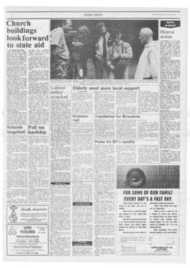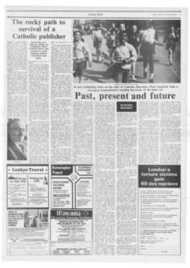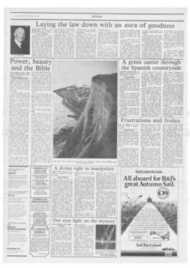Page 4, 5th October 1990
Page 4

Report an error
Noticed an error on this page?If you've noticed an error in this article please click here to report it.
Tags
Share
Related articles
Why Those Seeking A New Society Are Against The Family
Row Other People Manage To Live
Pastor Iuventus
What's Harriet Done To Amelia?
Inspired By "catholic Herald"
Listening to the cry of the poor
"WE don't go out or have a social life at all. We have to do without new shoes and clothes. Can't really afford to buy family birthday gifts." (EG, Leyland).
"The poll tax is certainly hurting our family. It is £297 each and our rates bill was equal to a single poll tax. We have four children, three at school and one only two years old. I don't work. We live in a modest semi. Because I don't earn, my husband has to pay my tax as well as his own. We are paying out of our savings." (LB, West Sussex).
These are two of the many quotes contained in a report on the impact of the poll tax published this week by Church Action on Poverty (CAP). The quotes are personal, straightforward accounts of how the community charge is hitting ordinary families in ordinary streets in ordinary towns around Britain.
Many will dismiss them as circumstantial, an inadequate and incomplete picture of the community charge's performance (although the report contains a whole array of well-researched statistics backing up its claim that the tax is unjust, and is hitting the worst-off hardest).
But hearing the cry of the poor, as CAP has pointed out ceaselessly since its launch last year, must be our aim as Christians. And as Fr Michael Campbell-Johnston, Jesuit provincial. warned this week at a fringe meeting at the Labour Party conference in Blackpool, none of us should become complacent about the condition of those worse-off than ourselves. "The needs of the poor," he said, "should not take priority over the wants of the rich . . . the participation of marginalised groups in society is more important than the preservation of an order which excludes them."
If those in government chose to listen more closely to the poor, he went on, they might gain some insight into how to solve their problems. But they have to listen first.
Politicians, particularly those in power, often aren't very good at or very keen on listening. And they can become out of touch, unaware of the reality of ordinary people's lives.
The Christian churches have a particular role in trying to persuade politicians to be better listeners. Listening to others is (or should be) one of the main concerns of clergymen. They can, or should be able to, vouch for the benefits of actually taking a bit of time to hear someone else out.
blog comments powered by Disqus











